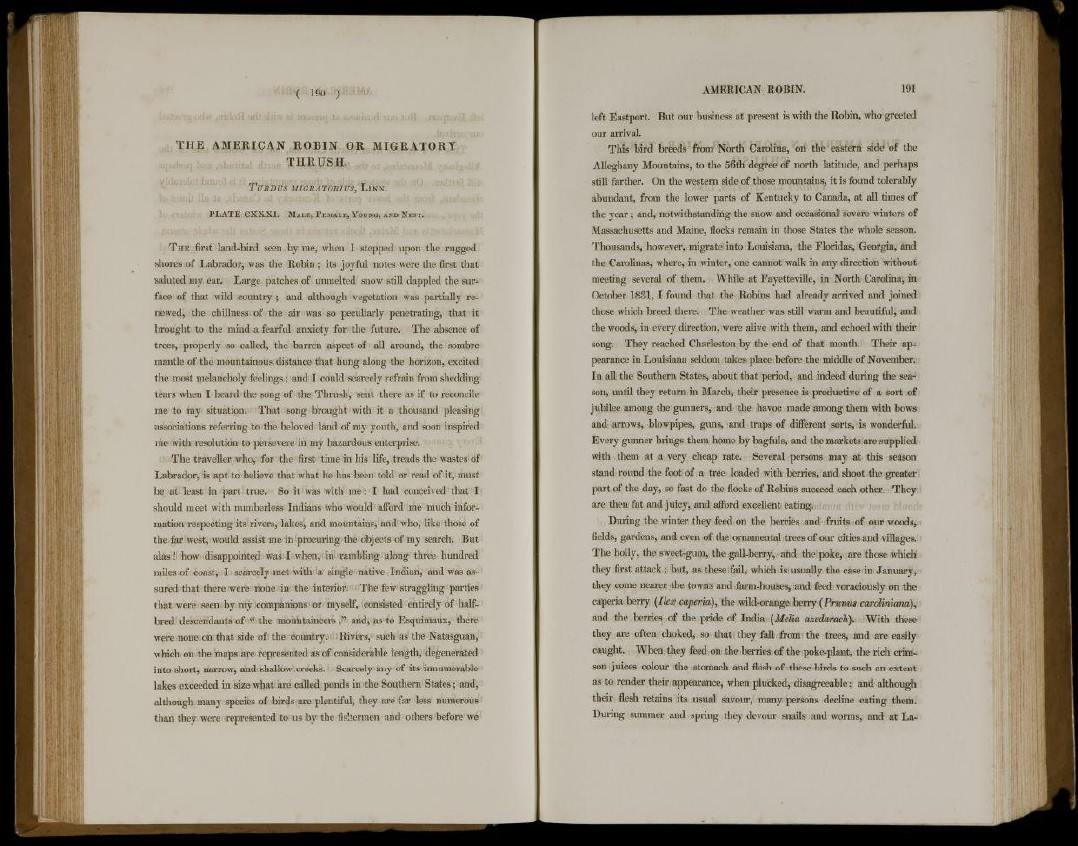
T H E A M E R I C A N R O B I N O R M I G R A T O R Y
T H R U S H .
TURDUS MIGRATORIUS, LlNN.
P L A T E C X X X I . MALE, F E M A L E , Y O U N G , A N D N E S T .
T H E first land-bird seen by me, when I stepped upon the rugged
shores of Labrador, was the Robin ; its joyful notes were the first that
saluted my ear. Large patches of unmelted snow still dappled the Sur*
face of that wild country ; and although vegetation was partially renewed,
the ch illness of the air was so peculiarly penetrating, that it
brought to the mind a fearful anxiety for the future. The absence of
trees, properly so called, the barren aspect of all around, the sombre
mantle of the mountainous distance that hung along the horizon, excited
the most melancholy feelings; and I could scarcely refrain from shedding
tears when I heard the song of the Thrush, sent there as if to reconcile
me to my situation. That song brought with it a thousand pleasing
associations referring to the beloved land of my youth, and soon inspired
me with resolution to persevere in my hazardous enterprise.
The traveller who, for the first time in his life, treads the wastes of
Labrador, is apt to believe that what he has been told or read of it, must
be at least in part true. So it was with me : I had conceived that I
should meet with numberless Indians who would afford me much information
respecting its rivers, lakes, and mountains, and who, like those of
the far west, would assist me in procuring the objects of my search. But
alas! how disappointed was I when, in rambling along three hundred
miles of coast, I scarcely met with a single native Indian, and was assured
that there were none in the interior. The few straggling parties
that were seen by my companions or myself, consisted entirely of halfbred
descendants of " the mountaineersand, as to Esquimaux, there
were none on that side of the country. Rivers, such as the Natasguan,
which on the maps are represented as of considerable length, degenerated
into short, narrow, and shallow creeks. Scarcely any of its innumerable
lakes exceeded in size what are called ponds in the Southern States; and,
although many species of birds are plentiful, they are far less numerous
than they were represented to us by the fishermen and others before we
left Eastport. But our business at present is with the Robin, who greeted
our arrival.
This bird breeds from North Carolina, on the eastern side of the
Alleghany Mountains, to the 56th degree of north latitude, and perhaps
still farther. On the western side of those mountains, it is found tolerably
abundant, from the lower parts of Kentucky to Canada, at all times of
the year; and, notwithstanding the snow and occasional severe winters of
Massachusetts and Maine, flocks remain in those States the whole season.
Thousands, however, migrate into Louisiana, the Floridas, Georgia, and
the Carolinas, where, in winter, one cannot walk in any direction without
meeting several of them. While at Fayetteville, in North Carolina, in
October 1831, I found that the Robins had already arrived and joined
those which breed there. The weather was still warm and beautiful, and
the woods, in every direction, were alive with them, and echoed with their
song. They reached Charleston by the end of that month. Their appearance
in Louisiana seldom takes place before the middle of November.
In all the Southern States, about that period, and indeed during the season,
until they return in March, their presence is productive of a sort of
jubilee among the gunners, and the havoc made among them with bows
and arrows, blowpipes, guns, and traps of different sorts, is wonderful.
Every gunner brings them home by bagfuls, and the markets are supplied
with them at a very cheap rate. Several persons may at this season
stand round the foot of a tree loaded with berries, and shoot the greater
part of the day, so fast do the flocks of Robins succeed each other. They
are then fat and juicy, and afford excellent eating.
During the winter they feed on the berries and fruits of our woods,
fields, gardens, and even of the ornamental trees of our cities and villages.
The holly, the sweet-gum, the gall-berry, and the poke, are those which
they first attack; but, as these fail, which is usually the case in January,
they come nearer the towns and farm-houses, and feed voraciously on the
caperia berry (Ilex caperia), the wild-orange berry (Prunus caroliniana),
and the berries of the pride of India (MeUa azedarach). With these
they are often choked, so that they fall from the trees, and are easily
caught. When they feed on the berries of the poke-plant, the rich crimson
juices colour the stomach and flesh of these birds to such an extent
as to render their appearance, when plucked, disagreeable; and although
their flesh retains its usual savour, many persons decline eating them.
During summer and spring they devour snails and worms, and at La